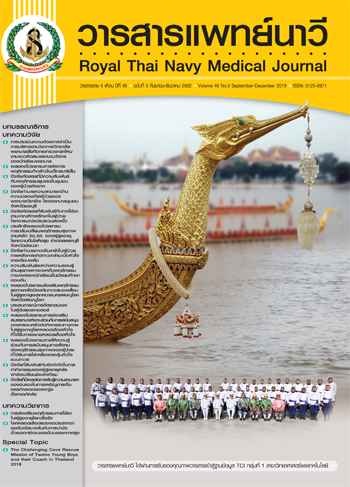Self-Stigma Experiences in Persons with Alcohol Dependence
Main Article Content
Abstract
This qualitative research used Husserl phenomenology approach. The purpose was to describe the self-stigma experiences in persons with alcohol dependence. Both men and women, ages of 20 - 59 years, more than one admission to inpatient and rehabilitation treatment, no comorbid of psychiatric disorders and without alcohol withdrawal syndrome. Data were collected by using the in-depth interviews according to interviews guidelines along with audio recording. Data were transcribed verbatim and analyzed by using Colaizzi method until the data saturation was achieved from 15 informants.
The findings revealed that self-stigma in persons with alcohol dependence means the ideas and feelings towards themselves that they are bad people due to alcohol dependence. As a result of repeated trauma caused by words and actions from their family and society, they are wrongly convinced to accept and feel that they are a terrible person. The self-stigma experiences in persons with alcohol dependence consisted of 3 major themes: 1) perception of family and social perspective, 2) self-acceptance as perceived by society, and 3) effect from self-stigma.
The results of this research, which is basic knowledge for nurses and health care team in the development of appropriate treatment processes. The understanding of the thoughts and feelings of self-stigma in alcohol dependence. In order to nursing that is suitable and meet with the needs of alcohol dependence people who have stigmatized themselves in order to prevent alcohol relapse in the future.
Article Details

This work is licensed under a Creative Commons Attribution-NonCommercial-NoDerivatives 4.0 International License.
References
World Health Organization. Management of substance abuse unit: global status report on alcohol and health. Switzerland: Luxembourg; 2014.
Department of Mental Health. Survey of mental health problems in Thai people 2016. [Internet]. [cited 2018 May 1]. Available from: https://www.dmh.go.th/news-dmh/view. (in Thai).
World Health Organization. The ICD-10 classification of mental and behavioral disorders: diagnostic criteria for research. Switzerland: WHO; 1993.
Saengchanchai P. Textbook of addiction medicine. Pathum Thani: Office of Printing Business Veterans Organization; 2005. (in Thai).
Potenza MN, Sofuoglu M, Carroll KM, Rounsaville BJ. Neuroscience of behavioral and pharmacological treatments for addictions. Neuron 2011;69(4):695-712.
Schomerus G, Holzinger A, Matschinger H, Lucht M, Angermeyer MC. Public attitudes towards alcohol dependence. Psychiatr Prax 2010;37(3):111-8.
Schomerus G, Lucht M, Holzinger A, Matschinger H, Carta MG, Angermeyer MC. The stigma of alcohol dependence compared with other mental disorders: a review of population studies. Alcohol Alcohol 2011;46(2):105-12.
Kanato M, Phanthet W. Percieved stigma of the general public for marijuana users, smokers and alcohol drinkers in Udon Thani province. Journal of Community Health Development Khon Kaen University 2016;4(2):211-4. (in Thai).
Sareelae N, Jooprempree K, Munluan K. The stigma of patients with alcohol use disorder with discrimination and the human rights in the community way of life. Srinagarind Med J 2018;33(6):589-94. (in Thai).
Schomerus G, Corrigan PW, Klauer T, Kuwert P, Freyberger HJ, Lucht M. Self-stigma in alcohol dependence: consequences for drinking-refusal self-efficacy. Drug Alcohol Depend 2011;114(1):12-7.
Labas SD. Alcohol use: social aspect, gender differences and stigmatization. Alcoholism and psychiatry research: Journal on Psychiatric Research and Addictions 2016;52(1):51-64.
Keyes KM, Hatzenbuehler ML, McLaughlin KA, Link B, Olfson M, Grant BF, et. al. Stigma and treatment for alcohol disorders in the United States. Am J Epidemiol 2010;172(12):1364-72.
Matthews S, Dwyer R, Snoek A. Stigma and self-stigma in addiction. J Bioeth Inq 2017; 14(2):275-86.
Totharong P, Limprasutr P, Wannapornsiri C. Experience of persistent cut down of alcohol intake among former alcohol dependence. Journal of Nursing Science Naresuan University 2008;2(2):45-61. (in Thai).
Sampaiboon N. Alcoholics and social disorder. [Master’s Thesis, Faculty of Sociology and Anthropology]. Thammasat University; 2010. (in Thai).
Husserl E. Ideas; general introduction to pure phenomenology. London: George allen & Unwin; 1969.
Colaizzi PF. Psychological research as the phenomenologist views it. In: Valle RS, King M, editors. Existential phenomenological alternatives for psychology. Oxford: Oxford University Press; 1978. p. 48-71.
Lincoln YS, Guba EG. Establishing trustworthiness. Naturalistic Inquiry 1985;289:331.
Corrigan PW, Rao D. On the self-stigma of mental illness: stages, disclosure, and strategies for change. Can J Psychiatry 2012;57(8):464-9.
Corrigan PW. How stigma interferes with mental health care. Am Psychol 2004;59(7):614-25.
Mora-Ríos J, Ortega-Ortega M, Medina-Mora ME. Addiction-related stigma and discrimination: a qualitative study in Treatment Centers in Mexico City. Subst Use Misuse 2017;52(5):594-603.
Yang LH, Wong LY, Grivel MM, Hasin DS. Stigma and substance use disorders: an international phenomenon. Curr Opin Psychiatry 2017;30(5):378-88.


